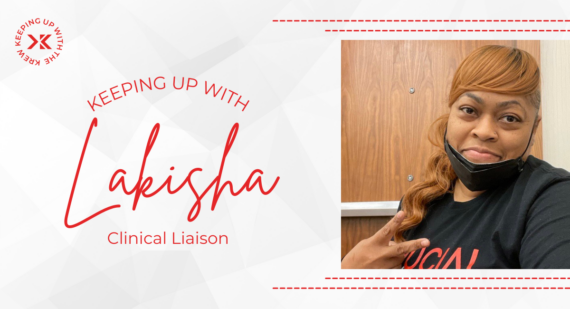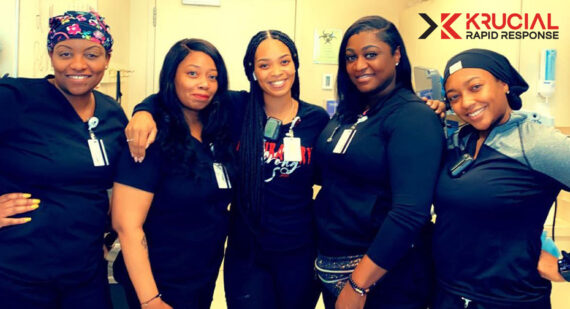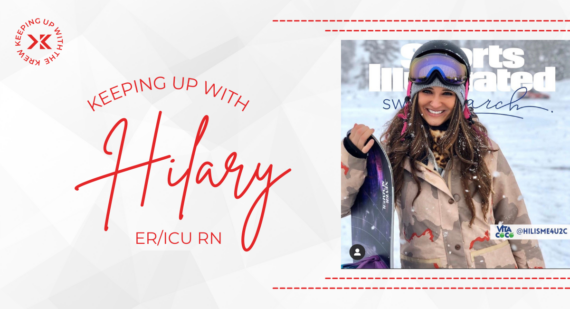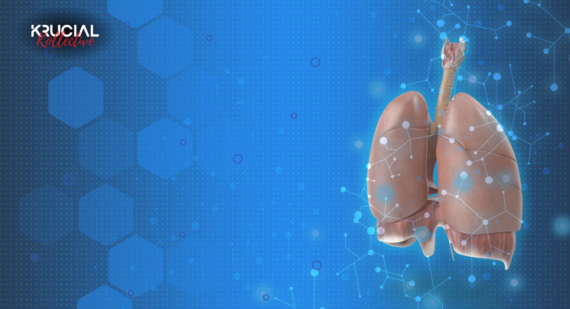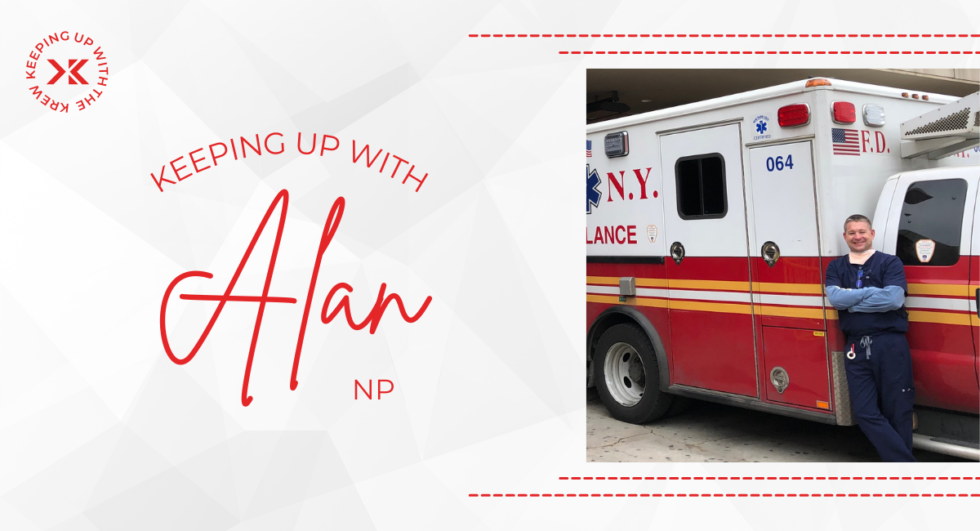
Keeping Up with the Krew: Alan
By: Courtney Holmes
At the start of 2020, Alan thought he would be spending the year with his family in North Carolina. He figured it would be a year like the last. He thought he would be working at the local hospital as an emergency room registered nurse while studying to finish his nurse practitioner license. However, things tend to change.
Before Alan got his nursing license, he was an emergency medical technician for eight years. Then he worked as a nurse in the emergency room for 12 years. As a nurse, he started to think about getting his nurse practitioner license, which would allow him even more options in his career. Nurse practitioners handle more medication management with scriptwriting for patients. They also create orders that instruct nurses on what to complete for patient care. Alan wanted to care for patients from medication to total patient which caused him to start his journey in 2019 to get his nurse practitioner degree.
Before the shutdown in 2020, he was sitting in class when his classmate’s phone went off. She mentioned that there was an agency looking to send people to New York for an unknown virus that was starting to tear through the city making people sick.
“That is right up my alley,” Alan said.
At the time, Krucial Rapid Response was not even a year old, had little social media presence, and most people did not even know how to spell Krucial’s name correctly.
Alan wrote down the number to talk to his family about potentially going as he had never traveled for work before. There was great danger in leaving his family to travel; deaths were starting to be reported daily. After many talks with his family, who knew how much his emergency experience would bring tremendous value to helping in the disaster, they decided it would be best for him to go help.
Before Alan knew it, he was in New York with the first wave of medical staff. According to Alan, his “roots” are in emergencies. Tending patients with severe stress and panic have always been his specialty. Despite his successful 21-year career in healthcare, he never anticipated what he was about to experience.
“It is hard to find words because it was a nightmare,” Alan said. “It was nerve-wracking. It was an amazing experience all and all, in many ways; good, bad, and indifferent. The uncertainty was a level that I have never experienced before.”
Alan was on the frontline before there was clear treatment. He was in a city he had never been to before, with a company he had just found out about, with his support system thousands of miles away. Fear overwhelmed them every day wondering if they were going to contract the virus. Patients passing away became a daily occurrence. There were patients passing away in the waiting room waiting to be seen by the medical staff. The initial staff felt they were always behind in their treatment plans for patients. Regardless of the uncertainty, Alan continued to show up day in and out for his patients and new co-workers.
“It’s a virus we still don’t know anything about,” Alan said. “We are losing scores of people every single day. It was a roller coaster of emotions, but it was a level of contribution and achievement most healthcare workers spend their careers striving for, and most never find it. I remember thinking, we are a part of something that is way beyond one city or person.”
Despite the overwhelming circumstances at the hospital, what little free time Alan did have, he would come back every night to continue his nurse practitioner classes online. At first, there were so many COVID-19 cases staff worked multiple days in a row, some for 21 days (about 3 weeks) straight. Many would then demobilize after the stretch and go home. However, Alan did not go home. He stayed in New York until the surge was over.
Eventually, months into the initial deployment, doctors rolled out new medications that Alan saw first-hand help some patients. Alan saw the first initial drug administered to help patients diagnosed with hypoxia. He watched patients give consent, then take a chance on the treatment. He was right there when some patients responded extremely well to it and made a full recovery. That treatment is now used by doctors all over the world. This is a moment All
“There are three things you have to be before you go on emergency deployment: you have to be willing; you have to be able, and you have to be available,” Alan said. “Anyone who is considering it, go! Because chances are, you will find what you have been looking for your entire career. The contacts you make on deployment are priceless, but the impact you have on patients is astronomical.”
Once the New York cases slowed down, Alan went home to his family. Within weeks, he left to go help Texas. Once in Texas, he served for most of the summer of 2020 with Krucial Staffing. He left to return to his family at the end of the summer to graduate from his nurse practitioner program.
However, this was not the end of assignments for Alan. When Hurricane Laura occurred in August of 2020, Alan stepped in to serve with us once again. It should be noted how hurricane deployments also require even more flexibility than our COVID-19 emergency response as there may be a lack of support staff such as a nurse’s aide. All missions require a ‘whatever it takes mentality but on hurricane missions, we do not know where staff will even be until the disaster occurs. It also differs because there is not necessarily a hospital you are assigned to. That was not a problem for Alan, he was just there to help.
Due to his experience with New York and Texas in the COVID units, he was able to step in to help anyone on that mission experiencing COVID-19 symptoms. After the cleanup of Hurricane Laura, he returned to his family with a total of three deployments with Krucial.
According to Alan, he would do Krucial full time to help those in their greatest time of need, but he must continue to put his family first.
Want to nominate someone to be featured? Please reach out to us at social_media@krucialrr.org
“It is hard to find words because it was a nightmare. It was nerve-wracking. It was an amazing experience all and all, in many ways; good, bad, and indifferent. The uncertainty was a level that I have never experienced before."
Alan, NP
